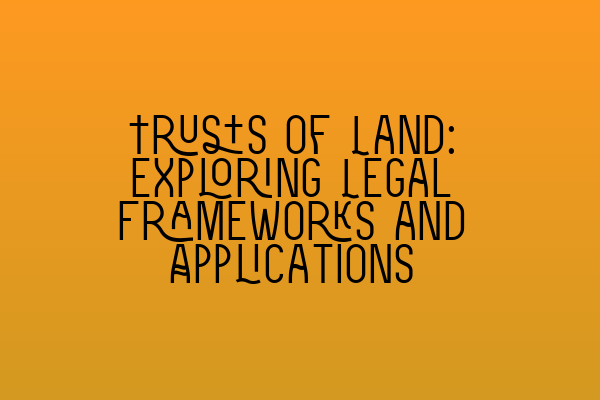Trusts of Land: Exploring Legal Frameworks and Applications
At SQE Property Law & Land Law, we understand the complexities of property law and the intricacies of trusts. In this blog post, we will delve into the legal frameworks and applications of trusts of land, shedding light on this crucial aspect of property ownership. Whether you are a solicitor, a property owner, or simply have an interest in property law, this article aims to provide you with a comprehensive understanding of trusts of land.
Before we delve into the legal frameworks and applications of trusts of land, let’s first understand what a trust is. A trust is a legal arrangement where a person, known as the settlor, transfers the legal ownership of assets or property to another person or entity, known as the trustee, who holds and manages these assets for the benefit of another person or group of people, known as the beneficiaries. Trusts are widely used in estate planning, wealth protection, and property ownership.
Now, let’s explore the legal frameworks surrounding trusts of land. In the UK, the Trusts of Land and Appointment of Trustees Act 1996 (TOLATA) is the key legislation governing trusts of land. TOLATA sets out the rights, duties, and obligations of trustees, beneficiaries, and those with an interest in land held under a trust. It provides a comprehensive legal framework for the creation, operation, and termination of trusts of land.
One of the main applications of trusts of land is in the context of co-ownership of property. When two or more individuals purchase a property together, they may hold it as joint tenants or tenants in common. In the former, each co-owner has an equal share in the property, and upon the death of one tenant, their share automatically transfers to the surviving co-owner(s). In the latter, each co-owner can hold a different share in the property, and their share can be freely transferred or inherited according to their wishes.
Trusts of land can also be used to protect the interests of vulnerable beneficiaries, such as minors or individuals lacking mental capacity. In such cases, a trustee is appointed to manage the property on behalf of the beneficiary until they reach a certain age or regain their capacity. This ensures that the beneficiary’s interests are safeguarded and that the property is managed in their best interests.
Furthermore, trusts of land are often used in family settlements and estate planning. In these scenarios, a family may create a trust to hold their assets, including property, for the benefit of future generations. This allows for effective intergenerational wealth transfer and asset protection, ensuring that the family’s wealth is preserved and managed in a structured manner.
It is important to note that trusts of land can give rise to legal disputes and challenges. Disagreements may arise regarding the distribution of income or capital from the trust, the appointment of trustees, or the interpretation of the trust deed. Seeking professional legal advice in such situations is crucial to protect your interests and navigate the complexities of trust law.
At SQE Property Law & Land Law, we specialize in advising clients on trusts of land and resolving trust-related disputes. Our team of expert solicitors has extensive knowledge and experience in the intricacies of property law and trust law. We can assist you in creating, managing, and terminating trusts of land, as well as providing legal representation in trust-related litigation.
In conclusion, trusts of land play a vital role in property ownership and estate planning. Understanding the legal frameworks and applications of trusts of land is crucial for solicitors, property owners, and anyone involved in property transactions. Whether you require assistance with creating a trust, managing a trust, or resolving a trust-related dispute, our team at SQE Property Law & Land Law is here to help.
For further guidance on preparing for your SQE Property Practice exam, read our article on SQE Preparation for Property Practice: Mapping Out Your Strategy. Stay updated on the latest changes in UK property laws by visiting our article on Updates in UK Property Laws: Key Changes and Implications. If you are interested in learning about the legal challenges in property transactions, our comprehensive guide on Legal challenges in property transactions will provide you with valuable insights. Additionally, our article on Navigating Lease Laws in the UK: Essential Guidelines for Tenants and Landlords offers essential guidelines on lease laws. Finally, to ensure success in your property law questions, check out our article on Dominating Property Law Questions: Avoiding Common Pitfalls.
Remember, when it comes to trusts of land and property law, SQE Property Law & Land Law is your trusted partner. Contact us today for expert advice and representation in all your property law matters.
